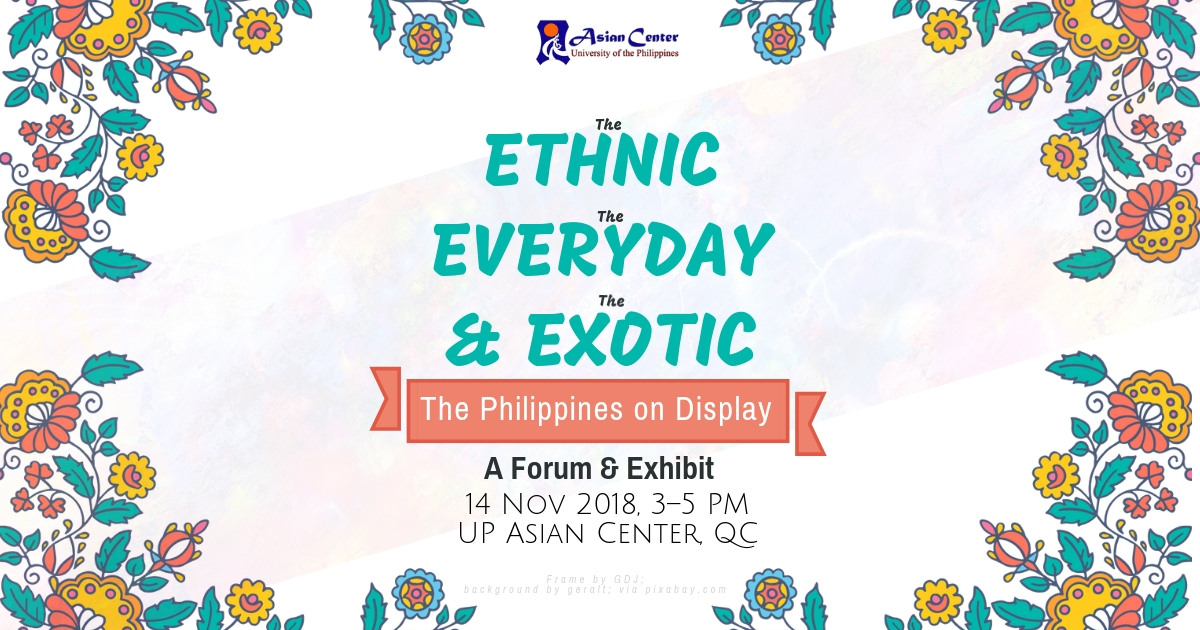
The UP Asian Center will be holding a forum-exhibit, The Ethnic, The Everyday, and the Exotic: The Philippines on Display, on 14 November 2018, 3 pm–5 pm, UP Asian Center, Quezon City. The event is free and open to the public, but participants are encouraged to sign up.
TWO LECTURES
- “Selling the “Exotic Ethnic”: The History of Filipiniana Stores” | Corinne Romabiles
Visually merchandizing the Philippines has a long history that dates back to the ethnographic collections in world exhibits in Madrid and Barcelona in the late 1800s. Today, the consumption of, and penchant for the ‘exotic ethnic’ continue to rise, catching up with the restless demand of an ever more urbane and sophisticated public. Often, the Filipiniana theme is utilized for the purposes of pure commerce, devoid of any intent towards a cultural or socio‐civic enrichment.
This presentation aims to critically assess why retail companies unreservedly brand their stores with the noun/adjective Filipiniana and how they deploy the techniques of visual merchandising in representing or misrepresenting the Philippines, Filipino and Filipino‐ness. Through discourse analysis, the presentation examines the significance of ‘using’ the idea of ethnic identity in retailing, the operators of Filipiniana stores and displays, and their assumptions in visual merchandising.
- The Sapatero in the History of the Philippines’ Footwear Capital | Concepcion Lagos
This presentation begins with the story of the footwear-making industry in the sleepy town of Mariquina at the end of the nineteenth century. It examines the periods and ‘perceived moments’ when footwear production in the city reached national prestige and encountered obstacles; ascertains the causes of this localized industry’s presently informal structures as adaptations to a series of local, national, and global challenges; discusses how private retailers and the city’s local government promote Marikina footwear, and help improve the state of footwear-making and the lives of Marikina’s sapatero. The presentation features life histories of sapatero who have witnessed a time of prosperity and periods of setbacks in this localized industry.
EXHIBIT
- “Pinoy Life: the Lighter Side of Things from Old and Not-so-Old Objects” is organized by alumni of the UP Asian Studies and Philippine Studies programs. The exhibit showcases elements of how everyday objects in the Philippines reveal a creativity and innovative mindset that could be traced to the roots of Filipino identity, including distinct Southeast Asian influences. There will also be surprises in store, both tickling the imagination and the gastronomic palate: Pamatid Uhaw, Pang Himagas at Konting Pang Minindal.
ABOUT THE EVENT
The forum-exhibit is being held as part of the 63rd anniversary of the UP Asian Center.
INQUIRIES
For queries, please email asiancenter.up.edu.ph.
The Asian Center offers M.A. degrees in Asian Studies with four fields of specialization: Northeast Asia, Southeast Asia, South Asia, and West Asia. The Center also has an M.A. program in Philippine Studies that allows students to major in Philippine society and culture, Philippine foreign relations, or Philippine development studies. The Center offers a Ph.D. program in Philippine Studies in conjunction with the College of Arts and Letters and the College of Social Sciences and Philosophy. For an overview of these graduate programs, click here. The Asian Center also publishes Asian Studies: Journal of Critical Perspectives on Asia, the latest issue of which can be downloaded at the journal's website. For other news and upcoming events at the Asian Center, click here.

